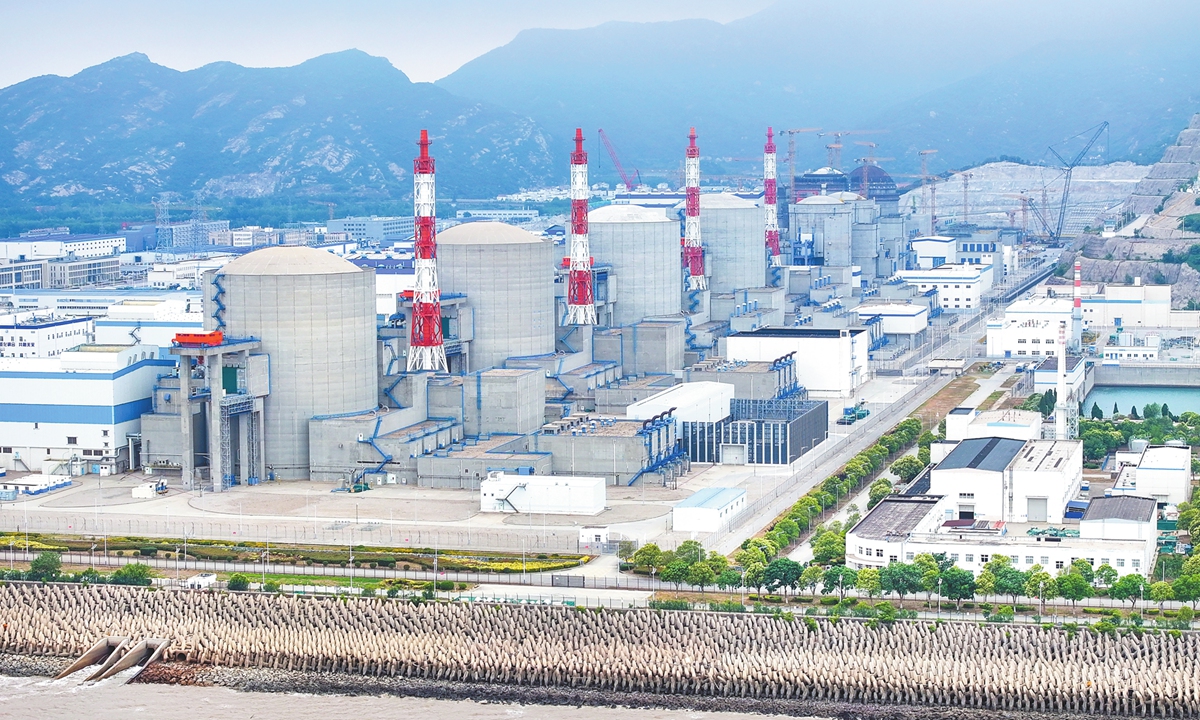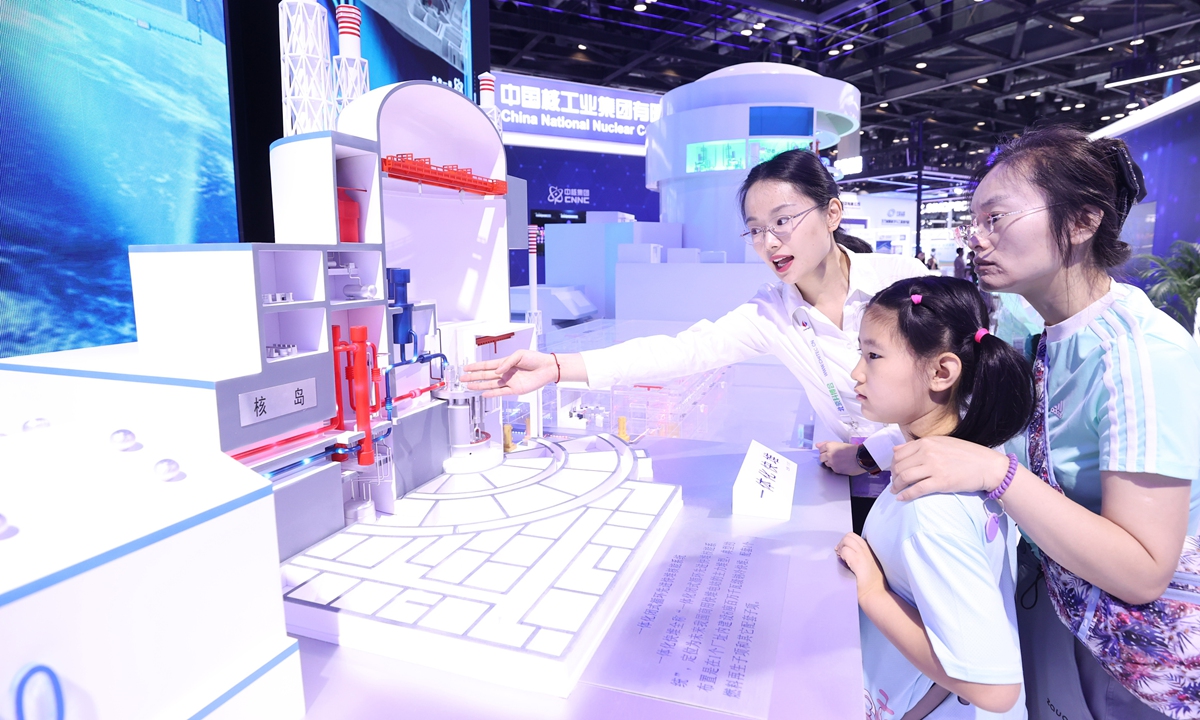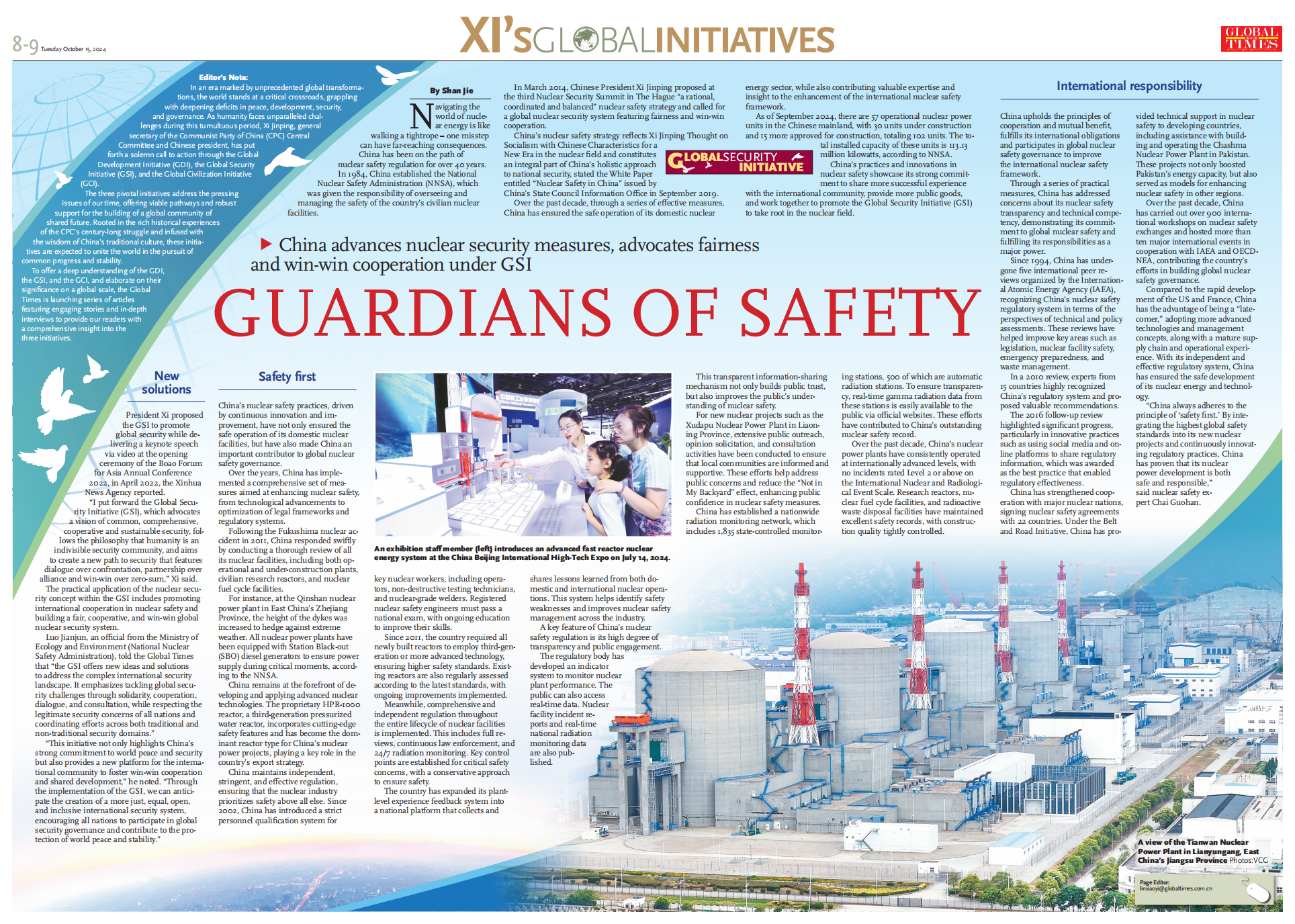IN-DEPTH / IN-DEPTH
China advances nuclear security measures, advocates fairness and win-win cooperation under GSI
Guardians of safety

A view of the Tianwan Nuclear Power Plant in Lianyungang, East China's Jiangsu Province Photo:VCG
Editor's Note:In an era marked by unprecedented global transformations, the world stands at a critical crossroads, grappling with deepening deficits in peace, development, security, and governance. As humanity faces unparalleled challenges during this tumultuous period, Xi Jinping, general secretary of the Communist Party of China (CPC) Central Committee and Chinese president, has put forth a solemn call to action through the Global Development Initiative (GDI), the Global Security Initiative (GSI), and the Global Civilization Initiative (GCI).
The three pivotal initiatives address the pressing issues of our time, offering viable pathways and robust support for the building of a global community of shared future. Rooted in the rich historical experiences of the CPC's century-long struggle and infused with the wisdom of China's traditional culture, these initiatives are expected to unite the world in the pursuit of common progress and stability.
To offer a deep understanding of the GDI, the GSI, and the GCI, and elaborate on their significance on a global scale, the Global Times is launching series of articles featuring engaging stories and in-depth interviews to provide our readers with a comprehensive insight into the three initiatives.
Navigating the world of nuclear energy is like walking a tightrope - one misstep can have far-reaching consequences.
China has been on the path of nuclear safety regulation for over 40 years.
In 1984, China established the National Nuclear Safety Administration (NNSA), which was given the responsibility of overseeing and managing the safety of the country's civilian nuclear facilities.
In March 2014, Chinese President Xi Jinping proposed at the third Nuclear Security Summit in The Hague "a rational, coordinated and balanced" nuclear safety strategy and called for a global nuclear security system featuring fairness and win-win cooperation.
China's nuclear safety strategy reflects Xi Jinping Thought on Socialism with Chinese Characteristics for a New Era in the nuclear field and constitutes an integral part of China's holistic approach to national security, stated the White Paper entitled "Nuclear Safety in China" issued by China's State Council Information Office in September 2019.
Over the past decade, through a series of effective measures, China has ensured the safe operation of its domestic nuclear energy sector, while also contributing valuable expertise and insight to the enhancement of the international nuclear safety framework.
As of September 2024, there are 57 operational nuclear power units in the Chinese mainland, with 30 units under construction and 15 more approved for construction, totaling 102 units. The total installed capacity of these units is 113.13 million kilowatts, according to NNSA.
China's practices and innovations in nuclear safety showcase its strong commitment to share more successful experience with the international community, provide more public goods, and work together to promote the Global Security Initiative (GSI) to take root in the nuclear field.
New solutions
In April 2022, President Xi proposed the GSI to promote global security while delivering a keynote speech via video at the opening ceremony of the Boao Forum for Asia Annual Conference 2022, the Xinhua News Agency reported.
"I put forward the Global Security Initiative (GSI), which advocates a vision of common, comprehensive, cooperative and sustainable security, follows the philosophy that humanity is an indivisible security community, and aims to create a new path to security that features dialogue over confrontation, partnership over alliance and win-win over zero-sum," Xi said.
The practical application of the nuclear security concept within the GSI includes promoting international cooperation in nuclear safety and building a fair, cooperative, and win-win global nuclear security system.
Luo Jianjun, an official from the Ministry of Ecology and Environment (National Nuclear Safety Administration), told the Global Times that "the GSI offers new ideas and solutions to address the complex international security landscape. It emphasizes tackling global security challenges through solidarity, cooperation, dialogue, and consultation, while respecting the legitimate security concerns of all nations and coordinating efforts across both traditional and non-traditional security domains."
"This initiative not only highlights China's strong commitment to world peace and security but also provides a new platform for the international community to foster win-win cooperation and shared development," he noted. "Through the implementation of the GSI, we can anticipate the creation of a more just, equal, open, and inclusive international security system, encouraging all nations to participate in global security governance and contribute to the protection of world peace and stability."
Safety first

An exhibition staff member (left) introduces an advanced fast reactor nuclear energy system at the China Beijing International High-Tech Expo on July 14, 2024. Photo:VCG
China's nuclear safety practices, driven by continuous innovation and improvement, have not only ensured the safe operation of its domestic nuclear facilities, but have also made China an important contributor to global nuclear safety governance.Over the years, China has implemented a comprehensive set of measures aimed at enhancing nuclear safety, from technological advancements to optimization of legal frameworks and regulatory systems.
Following the Fukushima nuclear accident in 2011, China responded swiftly by conducting a thorough review of all its nuclear facilities, including both operational and under-construction plants, civilian research reactors, and nuclear fuel cycle facilities.
For instance, at the Qinshan nuclear power plant in East China's Zhejiang Province, the height of the dykes was increased to hedge against extreme weather. All nuclear power plants have been equipped with Station Black-out (SBO) diesel generators to ensure power supply during critical moments, according to the NNSA.
China remains at the forefront of developing and applying advanced nuclear technologies. The proprietary HPR-1000 reactor, a third-generation pressurized water reactor, incorporates cutting-edge safety features and has become the dominant reactor type for China's nuclear power projects, playing a key role in the country's export strategy.
China maintains independent, stringent, and effective regulation, ensuring that the nuclear industry prioritizes safety above all else. Since 2002, China has introduced a strict personnel qualification system for key nuclear workers, including operators, non-destructive testing technicians, and nuclear-grade welders. Registered nuclear safety engineers must pass a national exam, with ongoing education to improve their skills.
Since 2011, the country required all newly built reactors to employ third-generation or more advanced technology, ensuring higher safety standards. Existing reactors are also regularly assessed according to the latest standards, with ongoing improvements implemented.
Meanwhile, comprehensive and independent regulation throughout the entire lifecycle of nuclear facilities is implemented. This includes full reviews, continuous law enforcement, and 24/7 radiation monitoring. Key control points are established for critical safety concerns, with a conservative approach to ensure safety.
The country has expanded its plant-level experience feedback system into a national platform that collects and shares lessons learned from both domestic and international nuclear operations. This system helps identify safety weaknesses and improves nuclear safety management across the industry.
A key feature of China's nuclear safety regulation is its high degree of transparency and public engagement.
The regulatory body has developed an indicator system to monitor nuclear plant performance. The public can also access real-time data. Nuclear facility incident reports and real-time national radiation monitoring data are also published.
International responsibility
China upholds the principles of cooperation and mutual benefit, fulfills its international obligations and participates in global nuclear safety governance to improve the international nuclear safety framework.
Through a series of practical measures, China has addressed concerns about its nuclear safety transparency and technical competency, demonstrating its commitment to global nuclear safety and fulfilling its responsibilities as a major power.
Since 1994, China has undergone five international peer reviews organized by the International Atomic Energy Agency (IAEA), recognizing China's nuclear safety regulatory system in terms of the perspectives of technical and policy assessments. These reviews have helped improve key areas such as legislation, nuclear facility safety, emergency preparedness, and waste management.
In a 2010 review, experts from 15 countries highly recognized China's regulatory system and proposed valuable recommendations.
The 2016 follow-up review highlighted significant progress, particularly in innovative practices such as using social media and online platforms to share regulatory information, which was awarded as the best practice that enabled regulatory effectiveness.
China has strengthened cooperation with major nuclear nations, signing nuclear safety agreements with 22 countries. Under the Belt and Road Initiative, China has provided technical support in nuclear safety to developing countries, including assistance with building and operating the Chashma Nuclear Power Plant in Pakistan. These projects not only boosted Pakistan's energy capacity, but also served as models for enhancing nuclear safety in other regions.
Over the past decade, China has carried out over 900 international workshops on nuclear safety exchanges and hosted more than ten major international events in cooperation with IAEA and OECD-NEA, contributing the country's efforts in building global nuclear safety governance.
Compared to the rapid development of the US and France, China has the advantage of being a "latecomer," adopting more advanced technologies and management concepts, along with a mature supply chain and operational experience. With its independent and effective regulatory system, China has ensured the safe development of its nuclear energy and technology.
"China always adheres to the principle of 'safety first.' By integrating the highest global safety standards into its new nuclear projects and continuously innovating regulatory practices, China has proven that its nuclear power development is both safe and responsible," said nuclear safety expert Chai Guohan.

Guardians of safety

